- Home
- J. Clifton Slater
Uncertain Honor Page 9
Uncertain Honor Read online
Page 9
“What is this conference about?” Hamilcar inquired.
Bostar held up a hand to silence the General.
“Master Suffete, I apologize for the lack of seating for you,” Paltibaal stated. “I can send for an extra chair, if you like.”
“Unnecessary Master Suffete,” the Civil Judge declined. “I just need the essence of the argument so I can articulate it when I take it to the finance committee. You know how tight their purse strings are.”
The Military Judge’s face darkened at the veiled threat. He would be ecstatic when his term as Suffete was up. Once out of the position, the only time he would have to deal with the prickly man was in Congress.
“Will someone get the Civil Judge a chair,” Paltibaal shouted. “I need my co-Suffete to be comfortable and receptive. A chair for the Chief Judge, please, so we can proceed.”
The two guards squeezed through the doorway carrying a large highbacked chair.
“Where do you want it, sir?” one asked.
“I don’t know,” the Civil Judge pondered. “I guess on the far…no wait. Maybe on this side…No, no. How about in the aisle? Yes, centered just like Judge Paltibaal’s chair.”
The vein at the temple of the Military Judge throbbed. But the Judge kept his temper and waited for his Co-Suffete to settle.
“Are you comfortable?” Paltibaal questioned.
“Yes, yes. But we should get on with it,” the Civil Judge urged. “If not, this could take all afternoon.”
Another guest arrived but slid back beside the doorway, making himself as inconspicuous as possible. It might have worked if not for the scarlet cape and officer’s helmet. Spartans were never unobtrusive.
“The Special Branch welcomes General Xanthippus,” Paltibaal exclaimed. “Do you have anything to add to the proceedings?”
“No,” the Spartan stated.
A man in a robe stood, acknowledged the Chief Judges, tapped the floor with a staff, and raised his arms. The motion allowed the sleeves of his robe to slid back giving the appearance of him reaching for the sky.
“The Republic is preparing a fleet,” the floor speaker explained. “They intend to land on our shores and attack our great city.”
Everyone in the amphitheater gasped except for two men. One was the speaker who delivered the news. And not surprising, the Spartan was the other. The Sparta spy network was renowned for collecting information for their commanders. Even ones serving foreign governments.
“What are we going to do about it?” a member of the Special Branch demanded.
“Surely, you have a plan,” a second suggested.
“Our challenge is we do not have a large enough home force to defend our shores,” the floor speaker stated. “We must stop them before they leave Sicily. Or we fight a delaying tactic until we can bring in more mercenaries to protect the city.”
“Putting untrained warriors against the butchers of the Republic is asking for a slaughter,” Xanthippus offered.
His comment caused members in the auditorium to begin talking among themselves. After a few moments, the speaker rapped the floor and nodded to recognize the Military Suffete.
“General, that is something to consider,” Paltibaal acknowledged before inquiring. “Do you have more to add?”
“No. You pay me to train your home guard. That’s what I do,” the Spartan swirled his scarlet cape and when the fabric fell, it trailed out the doorway as if man and material had been blown away by the wind.
“How many ships-of-war are you proposing?” the Civil Judge asked.
“We recalled General Hamilcar just for this discussion,” the Military Judge noted.
The assembly shifted so every eye in the auditorium focused on the Elephant’s Trunk.
“Sir, our numbers depend on their number of warships,” Hamilcar exclaimed. “We need enough to sink their transports and the escorts. That will make any civilized nation see the errors of their ways and end the threat.”
The floor speaker went to his seat and rummaged around in a pack. Finally, he extracted a slim piece of parchment.
“The Senate of the Republic has ordered a fleet of three hundred and thirty warships,” he read.
The Civil Judge slammed his hands on his thighs sending the snaps of a double slap around the theater.
“Suffete, do you have something to add?” Paltibaal asked.
“Three hundred and thirty ships-of-war,” the Civil Judge snarled. “Have you any idea of the cost of that many ships?”
“General, what do you say to three hundred and thirty ships-of-war?” the Military Judge questioned.
“Not enough, sir,” Hamilcar replied. “We have learned the Republic employs slow but solid ships. And they fill the floating islands with trained infantrymen. To be assured of success in breaking the invasion fleet, we need a fleet of five hundred ships-of-war.”
“Five hundred?” the Civil Judge cried. “I’d rather throw myself into the sea and feed sharks than try to convince the finance committee to release that kind of funding.”
“I am sure the five hundred is an opening bid by the General,” the Military Judge suggested. “What is the real number?”
“Let me state this to every member of the Special Branch,” Hamilcar warned. “If you insist on sending me out with less ships-of-war, I will go to war for you. But understand, I will not accept responsibility if we fail. If you understand that, pick a number and I will lead the expedition to save the Qart Hadasht Empire.”
“They are launching three hundred and thirty,” the floor speaker repeated. “How about three hundred and fifty ships-of-war? You already have sixty-two at Sicily.”
“How many hungry mouths is that we need to feed?” the Civil Suffete asked.
“With the infantry and oarsmen, officers and sailors,” Hamilcar reported, “around one hundred and fifty thousand men.”
The Civil Suffete pushed out of his chair and rushed from the amphitheater. No one would admit it, but the Judge appeared to be ill.
“Couriers will go out this afternoon,” the Military Judge announced. “In three weeks, our harbor will be filled, and you, General Hamilcar, will be on your way with the biggest fleet the world has ever seen.”
Hamilcar saluted and with Bostar in his wake, he marched from the arena, and through the building. A short while later, they materialized in the market.
“Four hundred and twelve ships-of-war,” Bostar babbled. “I never thought to see that many vessels in one place. Aren’t you excited?”
“Excited is not the word I would use,” Hamilcar informed the older General. “I may be able to stop the Republic fleet. But just in case, I suggest you begin field maneuvers with whatever troops you have. Because General Bostar, due to a tight purse string, we may lose everything we hold dear.”
Act 4
Chapter 10 – Chasing Rations
Four times a day, the Messina strait reversed course. When it traveled southwest, the underpowered transports easily slipped through the narrow channel. But when the flow flipped and jetted northeast, the merchant ships couldn’t fight the strong current. Warships on the other hand, with hard rowing, could navigate the strait no matter the direction of the ocean water. But seeing as the Navy had to protect their supply vessels and transports, the five-bankers waited with the haulers.
“Centurion Kimo, we need to get ahead of the fleet,” Alerio reminded the Bellona’s skipper.
“First Principale set a fast tempo,” Kimo directed the first officer. “Navigators, take us through the strait.”
While the fleet waited and watched for branches and leaves as signs of the flow’s direction, the Psyche of Bellona rowed into the passageway. The flow, running counter to the keel buffeted the warship, rocking it bow to stern. Undaunted, the oarsmen powered through the Strait of Messina and shortly rowed by the harbor of Messina. When the strait widened, they set sails and, under wind and oar power, traveled nineteen miles down the strait.
At Scaletta, the ship be
ached, and the crew dug fire pits and set up shelters. Because the transports and troop carriers could only squeeze through the strait when the flow permitted, it would take the entire fleet two days to make the transit.
“Optio, come with me,” Alerio called to an NCO. “We’ll go secure the grain.”
Hektor fell in beside the two men and they marched off the beach. After a narrow grassy area, they located a trailhead. The path meandered up the hillside switching back and forth as it snaked from the beach to the village of Scaletta.
“It’s beautiful,” Hector observed. He stopped and stared into the distance. “I can see land across the water but can’t make out details.”
Below them the blue-green water of the strait glistened in the midday sun.
“Over there is Republic territory,” Alerio informed the youth. “A few miles north is the garrison and port of Rhégion.”
“How can you tell the location, sir?” the NCO inquired.
“Let’s just say, I’ve spent too many days gazing across these waters wishing for the safety of a Legion garrison,” Alerio replied. He looked upward at the hillside. “I don’t envy the porters getting grain down this path. Let’s go.”
The three hiked to the top, asked directions, and located the home of the village headsman. Moments later, they knocked on his door.
“This is your lucky day,” Alerio explained. “I’m here to buy all of your excess grain.”
“I’m sorry, Senior Tribune, but I can’t sell something I don’t have,” the old man professed. “All of our grain has been bought and shipped.”
“When?” Alerio asked.
“Two days ago, a merchant pulled in with three transports,” the village leader replied. “Oddly, the Phoenician didn’t haggle over the price. He paid and insisted the loading be done right away. Even sent his crews up and down to speed up the loading.”
Alerio thanked the chief. They left the villa and the Senior Tribune led Hektor and the NCO back to the trail.
“Centurion Kimo’s crew is not going to be happy,” he stated when they reached the top of the path.
The view had lost its attraction to the three as they picked their way down the winding track. At the bottom, Alerio broke the news to the ship’s senior officer. “Scaletta is out of grain. We need to get to Catania, today.”
“Why the rush, sir?” Kimo asked.
“The merchant who bought the grain was a Punic,” Alerio answered. “I don’t know if he’s an agent of the Qart Hadasht Empire. But if he is, we need to know.”
“What makes you think he’s an Empire agent, sir?” Kimo questioned.
He was hoping for a reprieve for his crew by having the staff officer think through the departure order.
“Because he didn’t haggle over the cost,” Alerio reported. “What type of trader pays the asking price?”
Between oarsmen, sailors, officers, and forty Marines, the warship Bellona had deposited three hundred and sixty men on the beach. And each man had unpacked for a day’s stay.
“Ship’s officers get them bundled up and reloaded,” Kimo instructed before advising. “We have forty-seven miles to go. The longer they take, the more the oarsmen will row.”
Under the threat of rowing for long periods to assist the sails, the oarsmen scrambled to repack, board, and launch the warship.
“This could present a problem,” Kimo suggested to Alerio.
“What could be worse than running out of food for the fleet?” Alerio inquired.
“Catania will be our last short hop,” Kimo advised Alerio. “The King of Syracuse won’t allow Republic warships to beach in his territory. I can’t imagine the stink he’ll raise if we park a fleet on his shoreline. Even with the treaty and trade agreements, King Hiero doesn’t trust our Senate.”
“Or he doesn’t want to offend the Qart Hadasht Empire,” Alerio added. “The two are old enemies. But they do have pacts in place.”
“Either way, because of the King, we need to trek around the tip of Sicilia to Pozzallo,” Kimo described. “That’s eighty miles, and with the grain shortage, it makes our fleet vulnerable. If they arrive at Pozzallo and there isn’t grain, you and I could be charged with incompetence.”
“Let’s get to Catania and see if they have grain,” Alerio advised. “We may be worrying for nothing.”
“From your lips to Laetitia’s ears,” Kimo offered.
“Your reference to the Goddess of Prosperity and Abundance is more than appropriate,” Alerio acknowledged.
He stepped to the rail of the steering deck and watched the shoreline slide by. While the Senior Tribune’s repose looked relaxed, inside his gut twisted with worry. Not for himself, but for the men and the mission of the fleet.
***
The Psyche of Bellona rowed under sails until the sun was behind the volcano. While the geographical feature blocked direct rays, Etna allowed light to shine from behind the peak. But enough was blocked that darkness didn’t creep up on the busy warship. It dropped as if a blanket was thrown over a sleeping man.
“Roll the sails and slow our rate,” Kimo ordered.
In the night, the pilots divided their time. One watched the dark rocky shoreline and the other steered the ship. And while navigation was their responsibility, every man on board was aware of the danger. Few lights appeared on shore and those that did presented a problem. Were they close to the water and good for plotting a course away from hazards? Or were the lights far inland and following them would draw the warship onto the rocks?
Hektor had collected his and Alerio’s luggage and piled it on the foredeck.
“What’s that for?” a sailor inquired.
“If we hit a rock and sink,” the boy told him, “I plan to get Senior Tribune Sisera’s gear off the ship.”
“The deck tilts on a sinking ship,” the sailor described. “You won’t be able to stand, let alone secure the staff officer’s bundles.”
“I’ll get the bundles to shore,” Hektor assured him. He lifted his leg and displayed a rope tied around his ankle. The other end looped around Alerio’s gear.
“You need an extra ten feet of rope,” the sailor told him. “That’s the depth of the water here. If you go in, you’ll want to be above water when the package hits the bottom.”
Hektor searched for more line. After adding a length, he curled the excess rope, rested his head on the coils, and went to sleep. He woke when a call travelled from the aft steering deck.
“Beach ahead. Stand by oars,” the first officer announced.
The warning was picked up by the second officer on the rower’s walk. In turn, he passed it onto the third officer at the bow.
“All clear for the turn maneuver,” the Third Principale declared.
Once the notice that there were no vessels nearby reached the First Principale, he ordered a U-turn and the backstrokes needed to put the warship on the beach.
“Third, get us high and dry,” the first officer instructed.
The third officer and half the oarsmen climbed over the sides, dropped into the water, and shoved the Bellona out of the strait and up onto the sand. The exhausted oarsmen collapsed on the beach. They were soon joined by their companions from the rowing decks.
“Don’t get too comfortable,” Kimo warned from the steering platform. “We leave before dawn.”
A collective moan rose from the rowers.
“It’s eighty miles to Pozzallo,” Kimo informed them, “and finding a suitable beach will be harder than here. Neither your officers nor our navigators know the area well enough to risk locating it in the dark. So, eat and rest but don’t get too comfortable.”
“I’m going into town to see the garrison commander and the grain merchant,” Alerio informed Kimo. “And I promise not to get too comfortable.”
“That’s good to hear, Senior Tribune,” Kimo responded. “Because if the grain merchant sailed from here, we might be able to catch him.”
“The whole thing about not knowing where to
find Pozzallo, was it a lie?” Alerio guessed.
“Yes, sir. I was just motivating the oarsmen,” Kimo admitted. “I’ve traveled this route many times. The first was with a relief force for Agrigento.”
“Thank you for that,” Alerio acknowledged as he scooped a purse from the trunk.
“You were there?” Kimo inquired.
“Yes, Centurion,” Alerio informed him. “We were up to our necks in mercenaries and running out of food.”
“There were so many trenches around the walls of the city,” Kimo offered, “they looked like a colony of giant voles had been there.”
“Not giant voles,” Alerio corrected while placing a leg over the rail. “Just three thousand infantrymen with shovels.”
He swung the other leg over and dropped to the sand. Before Alerio had gone two steps, another pair of boots dropped onto the sand. In a sprint, Hektor caught up with the Senior Tribune.
***
Shortly after leaving the beach, the defensive wall of Catania appeared in front of them.
“We can climb it,” Hektor suggested.
“We could but the Legion barracks is near the front,” Alerio told him. “It’s easier to hike around, and safer.”
“When does easier and safer register when you’re on a mission, sir?” the boy asked.
“Catania is eighteen miles from the walls of Syracuse,” Alerio stated. “Well within patrol range of the Syracusan cavalry. The town has survived King Pyrrhus, numerous Kings of Syracuse, the Sons of Mars, and other war bands that passed this way. They survived by being callous and shrewd. Think of the Legion garrison as backup. When I jingle the coin purse in front of the grain traders at Catania, I want friendly blades defending my back.”
“Easy and safe,” Hektor repeated. “I understand now.”
The Legionary on guard duty challenged them at the city gate. But as if the Senior Tribune were a hot rock, the sentry quickly gave the senior staff officer to the duty NCO. Almost in a jog, the Optio delivered Alerio to their Centurion’s quarters.

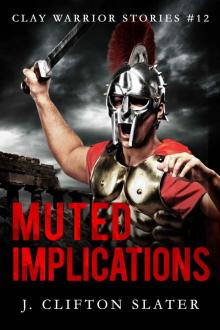 Muted Implications (Clay Warrior Stories Book 12)
Muted Implications (Clay Warrior Stories Book 12) Fatal Obligation
Fatal Obligation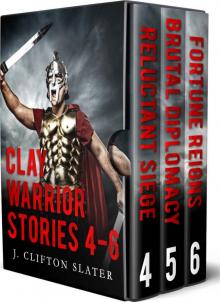 Clay Warrior Stories Boxset 2
Clay Warrior Stories Boxset 2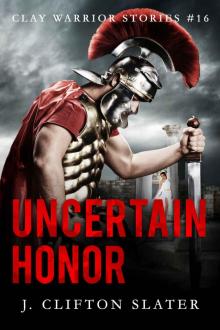 Uncertain Honor
Uncertain Honor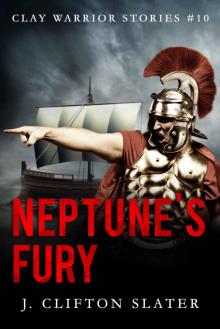 Neptune's Fury
Neptune's Fury Fortune Reigns
Fortune Reigns Op File Treason
Op File Treason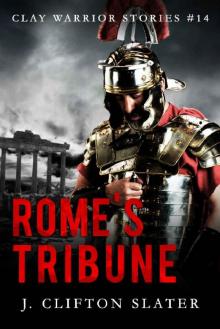 Rome's Tribune (Clay Warrior Stories Book 14)
Rome's Tribune (Clay Warrior Stories Book 14) Clay Warrior Stories Boxset 1
Clay Warrior Stories Boxset 1 Serpent Circles
Serpent Circles Reluctant Siege
Reluctant Siege Infinite Courage
Infinite Courage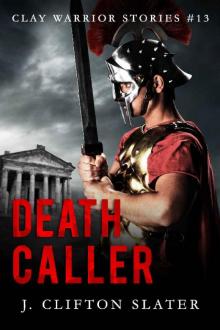 Death Caller (Clay Warrior Stories Book 13)
Death Caller (Clay Warrior Stories Book 13) Op File Sanction
Op File Sanction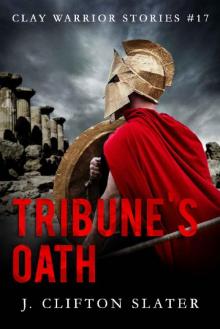 Tribune's Oath (Clay Warrior Stories Book 17)
Tribune's Oath (Clay Warrior Stories Book 17) Galactic Council Realm 1: On Station
Galactic Council Realm 1: On Station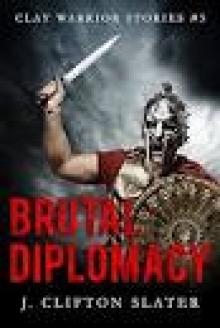 Brutal Diplomacy
Brutal Diplomacy Op File Revenge
Op File Revenge On Point
On Point Bloody Water (Clay Warrior Stories Book 3)
Bloody Water (Clay Warrior Stories Book 3) Galactic Council Realm 2: On Duty
Galactic Council Realm 2: On Duty Galactic Council Realm 3: On Guard
Galactic Council Realm 3: On Guard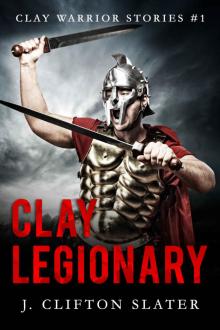 Clay Legionary (Clay Warrior Stories Book 1)
Clay Legionary (Clay Warrior Stories Book 1) On Point (Galactic Council Realm Book 4)
On Point (Galactic Council Realm Book 4) Op File Revenge (Call Sign Warlock Book 1)
Op File Revenge (Call Sign Warlock Book 1)